The Land of the Rising Sun, with its picturesque landscape, fine weather, and scrumptious cuisines, is the perfect place to migrate to if you want to study or work abroad. There are tons of job opportunities for skilled professionals as the country is currently facing a chronic labour shortage due to its ageing population. There is no time like the present to work in Japan.
However, if you plan to visit Japan any time soon, it is crucial that you learn Japanese and everything you can about the country’s rich cultural heritage in order to avoid experiencing a cultural shock.
One thing you must know is how big manners and politeness are in Japan. From bowing to their elders to keeping their homes and cities clean, the Japanese people are known for their remarkable etiquette. Moreover, they never fail to give credits when they are due. Once you are there, you will soon get used to saying “Thank you”, “Please”, “Excuse me”, etc. But, since the majority of them do not speak or understand English, you will have to say them in Japanese.
In a country like Japan, where people are overly courteous, it is important to know how to say Thank You. In this article, we will share with you the different ways to say Thank You in Japanese in various situations.
- How To Say Thank You In Japanese: 10 Words and Phrases
- 1. Arigatou (ありがとう)
- 2. Doumo Arigatou (どうもありがとう)
- 3. Arigatou gozaimashita (ありがとうございました)
- 4. Arigatou gozaimasu (ありがとうございます)
- 5. Sumimasen (すみません)
- 6. Osoreirimasu (恐れ入ります)
- 7. Hontōni arigataidesu (本当にありがたいです)
- 8. Maemotte kansha shimasu (前もって感謝します)
- 9. Anata no go shinsetsu ni kansha shimasu (貴方のご親切に感謝します)
- 10. Atsu atsuku orei rei o saru mōshi-jō agemasu (厚あつくお礼れいを申もうし上あげます)
How To Say Thank You In Japanese: 10 Words and Phrases
1. Arigatou (ありがとう)
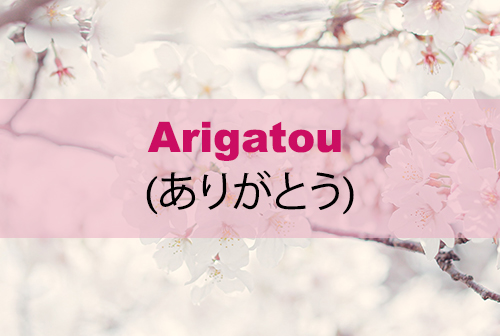
We are sure you have been familiar with the word “Arigatou”, especially if you are a fan of Japanese television shows and films. This is a casual way of thanking someone, much like saying “Thanks” in English.
A simple Thank You is the simplest way to show your gratitude no matter the occasion or circumstance. Be it when your partner opens the car door for you or a friend does you a favour, you can say “Arigatou” to show your appreciation or gratitude to your friends or even strangers.
“Arigatou” can be used to thank almost anyone, be it your friends, family members, colleagues, supervisors, or elders. It is quite flexible in that way. Moreover, one can modify it to add a different emphasis. For instance, if you add Doumo (which means “very much” in English) to your Arigatou, you are saying, “Thank you very much”.
2. Doumo Arigatou (どうもありがとう)
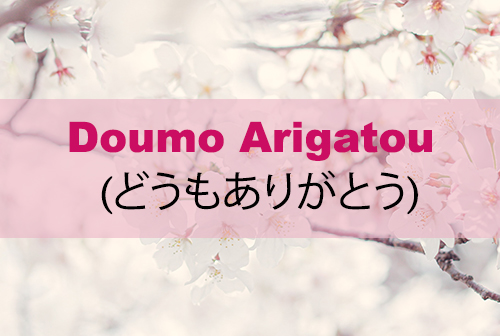
To add a little spice to your Thank Yous, just say, “Doumo arigatou” or “Doumo arigatou gozaimasu.” Adding ‘very much’ shows how truly appreciative you are. Putting up a smile on your face while saying it would make the receiver feel even more pleased.
“Dumo Arigatou” is a casual and one of the many ways of saying “Thank you” in Japanese. It can be used to express how thankful and appreciative you are to your friends, family members or anyone really. For instance, let’s say you have received a gift or someone (be it someone older or younger than you) has done you a big favour, you can say “Doumo arigatou” or “Doumo arigatou gozaimasu.”
Being friendly or appreciative doesn’t hurt anyone, so try to always add ‘doumo” to your “arigatous”.
3. Arigatou gozaimashita (ありがとうございました)
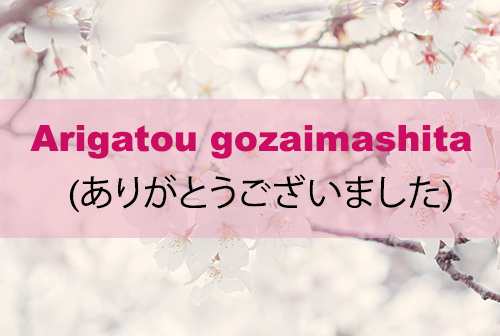
Although in the past tense, this is used when you thank someone for always being there for you or always helping you.
Saying “Arigatou gozaimashita” to someone will emphasise how appreciative you are with a touch of emotion. Depending on the situation, it can be used casually or formally.
For instance, you use this when you want to show your gratitude to your manager who has been training you or, let’s say it’s your mom’s birthday and you want to walk down memory lane and show her how appreciative you are for always taking care of you.
4. Arigatou gozaimasu (ありがとうございます)
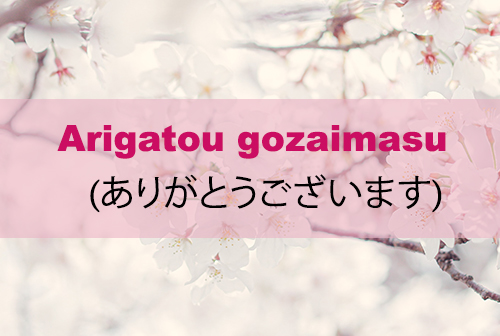
This is a more formal and polite way of saying Thank You in Japanese. You can use this to thank your boss by thanking him/her for always motivating and inspiring you or use it for your elders when they do something nice for you.
If you say this with a small head bow, it will show how appreciative you are. When you want to be exceptionally polite, you can say this to strangers who give up their seats for you and your friends/family on the bus or who open doors for you.
Moreover, for tourists, Arigatou gozaimasu is the ideal words to use to show how thankful you are. For instance, let’s say you are shopping for a souvenir on your visit to Japan and you buy a Chopsticks (Hashi) or Daruma dolls, you can thank the shopkeeper by saying “Arigatou gozaimasu.” Don’t forget to give a little head nod/bow while you say it.
5. Sumimasen (すみません)
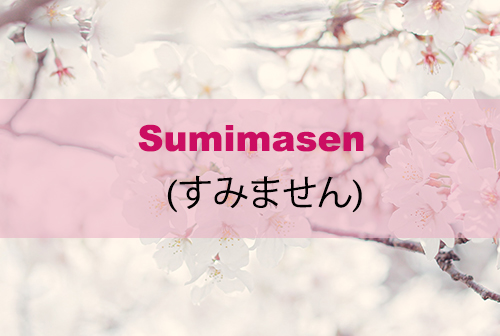
Although it also means Excuse Me, or I’m Sorry, Sumimasen can also be used to say Thank You in situations where someone has gone through much trouble to get or do something for you.
Now, Sumimasen may be a bit hard to understand for many people as it can mean different things in different scenarios, Japanese people use it all the time, and they know in which situations they can use it. You can use Sumimasen when you feel apologetic yet appreciative at the same time. You say it to anyone, be it in your professional or personal life. You can even use it to apologise to strangers.
For instance, someone has even taken a leave of absence because you are at the hospital and you need them to take care of you or stay with you. It’s like saying, “I feel bad that you had to go through all these troubles for me but thank you so much.”
6. Osoreirimasu (恐れ入ります)
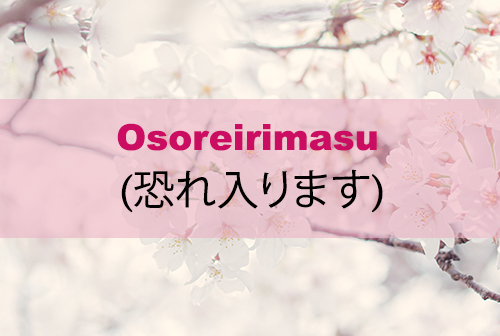
Use this at your place of work, especially when you are speaking to a client or a customer. This is a much more formal way of showing your appreciation.
For instance, let’s say you are talking to someone who holds a higher social status or position than you. As Oso reirimasu carries respect and fear in itself, you can use it when you want to express your appreciation to such people.
You can also use it to thank someone who has gone out of their way to help you in your darkest times.
Also, you can use Osoreirimasu to show your appreciation when someone is loyal to you. Let’s say your customer calls you and orders more of your product(s). You can use this word to thank them for always choosing you.
7. Hontōni arigataidesu (本当にありがたいです)
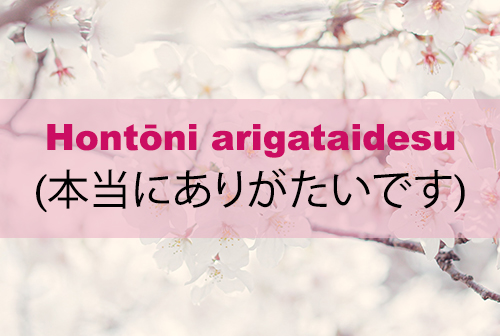
Hontōni arigataidesu means “I really appreciate it” in English. So, you can use this when someone does something nice for you, and you feel truly thankful.
When you want to say something along the line of “I really appreciate you for always covering for me when I am unavailable, ” you can say “Hontōni arigataidesu.”
Hontoni arigataidesu is one of the common Thank you phrases in Japanese that Japanese people use to show how extremely thankful they are to someone as it expresses strong emotions. It is also among the most polite ways to thank someone in Japanese.
8. Maemotte kansha shimasu (前もって感謝します)
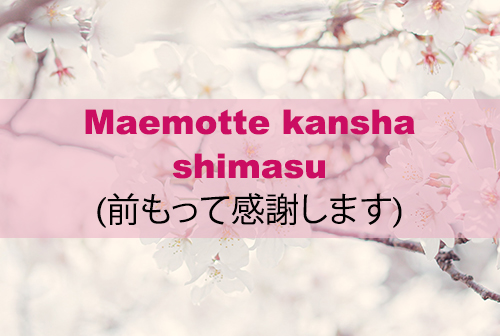
“Maemotte kansha shimasu” translates to “Thank you in advance” in English.
Let’s say you are asking someone for a favour and you might not be seeing or talking to them anytime soon again. Before or after telling them what you need from them, you can thank them in advance.
For instance, when you want to say. “Thanks in advance for dropping the kids to school today” to your husband, you can say, “Maemotte kansha shimasu”.
“Maemotte kansha shimasu” can be used in different situations as it honours the person you are speaking to. Let’s take a look at another example. Let’s say one of your close friends is buying something for you, and he/she lets you know about it. You can say “Maemotte kansha shimasu” to them to show how appreciative you are.
Also read: How To Say Goodnight in Japanese
9. Anata no go shinsetsu ni kansha shimasu (貴方のご親切に感謝します)
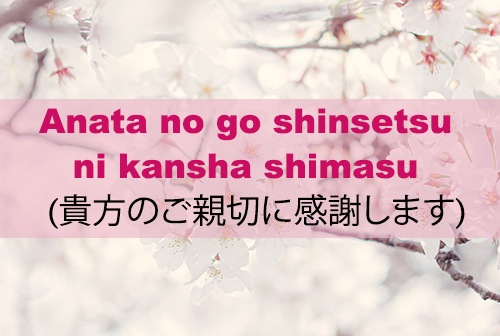
Sometimes when you thank someone, you want to compliment their kindness and good deeds as well.
“Anata no go shinsetsu ni kansha shimasu” expresses gratefulness and kindness in the most polite manner. It is a common phrase used by people who are travelling to and in Japan. You can use this phrase to thank your coworkers, classmates, friends or family members.
For instance, let’s say someone was covering your shift for you at work because you had the flu and couldn’t go to work. After an “Arigatou”, you can continue with “Anata no go shinsetsu ni kansha shimasu,” which translates to “That’s very kind of you.”
10. Atsu atsuku orei rei o saru mōshi-jō agemasu (厚あつくお礼れいを申もうし上あげます)
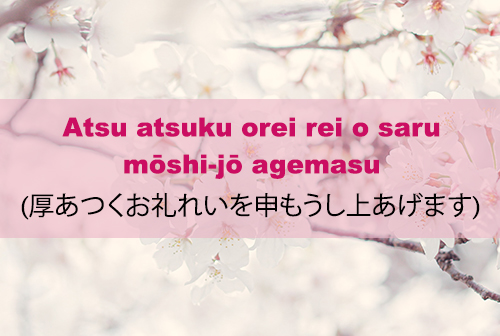
“Atsu atsuku orei rei o saru mōshi-jō agemasu” is a polite way to say “Thank you” in Japanese to your elders or supervisor/boss/manager at work or at work or your teachers.
As “Atsu atsuku orei rei o saru mōshi-jō agemasu” means “I would like to express my gratitude to you” in English, you can use this in instances when you want to show your gratitude to someone you look up to or have great respect or admiration for.
For instance, let’s say you are getting promoted to a managerial position after more than seven years of hard work and dedication to the company. You can thank your boss in a respectable way by saying “Atsu atsuku orei rei o saru mōshi-jō agemasu”
Well, there you go! You have now learned ten ways to say Thank You in Japanese.
Good luck!
Sayonara for now!



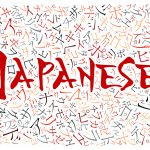

[…] To know more, visit:https://www.japan-academy.in/blog/different-ways-to-say-thank-you-in-japanese/ […]